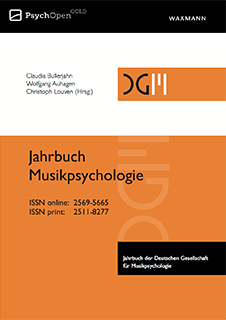The Yearbook of Music Psychology/Jahrbuch Musikpsychologie (JBDGM) was founded in 1984 by Klaus-Ernst Behne, Günter Kleinen and Helga de la Motte-Haber. It serves as the official scientific outlet of the German Society for Music Psychology (Deutsche Gesellschaft für Musikpsychologie, DGM). The Yearbook of Music Psychology follows international scientific standards and publishes empirical and theoretical contributions in German and English from all areas of music psychology and from related disciplines such as music sociology, music education, and musical acoustics. Manuscripts can be submitted in German or English.
 Since 2018, the Yearbook of Music Psychology/Jahrbuch Musikpsychologie (JBDGM) has been published as an online first publication with open access to all content in cooperation with the PsychOpen GOLD portal of the Leibniz Institute for Psychology (ZPID). Submitted manuscripts are published by PsychOpen immediately after a successful peer review process. In addition, the contributions also appear as a printed publication by Waxmann Verlag (Münster, Germany) once a year. The bound volume also contains additional book reviews and conference reports.
Since 2018, the Yearbook of Music Psychology/Jahrbuch Musikpsychologie (JBDGM) has been published as an online first publication with open access to all content in cooperation with the PsychOpen GOLD portal of the Leibniz Institute for Psychology (ZPID). Submitted manuscripts are published by PsychOpen immediately after a successful peer review process. In addition, the contributions also appear as a printed publication by Waxmann Verlag (Münster, Germany) once a year. The bound volume also contains additional book reviews and conference reports.
We are committed to open access to scientific research and its free dissemination. That's why the use of our content for readers, and the submission, review, and publication of contributions for authors are all free of charge!
We encourage readers to sign up for the publishing notification service for this journal. Use the Register link at the top of the home page for the journal. Once registered, readers will receive an email with the table of contents for each new issue of the journal.
Papers can be submitted at any time. Once the review process has been completed, accepted papers will be published as open access here as soon as possible.
 Since 2018, the Yearbook of Music Psychology/Jahrbuch Musikpsychologie (JBDGM) has been published as an online first publication with open access to all content in cooperation with the
Since 2018, the Yearbook of Music Psychology/Jahrbuch Musikpsychologie (JBDGM) has been published as an online first publication with open access to all content in cooperation with the